|
|
|
Sort Order |
|
|
|
Items / Page
|
|
|
|
|
|
|
| Srl | Item |
| 1 |
ID:
167575
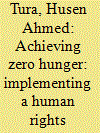

|
|
|
|
|
| Summary/Abstract |
A human rights approach to food security seeks to empower vulnerable groups to claim their rights. It also reinforces a government’s obligations to respect, protect and fulfil the right to food. Furthermore, it encourages the integration of the right to food into the design and implementation of food security policies. This article examines the human rights approach to food security, with specific reference to Ethiopia. It assesses the historical causes of Ethiopia’s food insecurity, and examines the legislative and policy measures that the country has adopted over the last three decades in order to achieve food security. Food insecurity in the country is largely explained by the absence of government accountability. In 1973 and 1984, the hunger caused by drought was transitioned to famine not because of overall unavailability of food in the country, but because the government failed to provide food aid to the starved people and concealed the occurrence of famines from the international donors. Despite designing some food security policies over the last three decades, the country has not yet adopted sufficient legislative and judicial measures to enforce the right to food. This article argues that Ethiopia should introduce a framework law on the right to food to end hunger in the context of achieving national food security.
|
|
|
|
|
|
|
|
|
|
|
|
|
|
|
|
| 2 |
ID:
015989
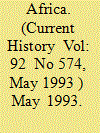

|
|
|
| 3 |
ID:
045349
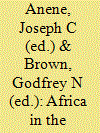

|
|
|
|
|
| Publication |
London, Ibadan University Press and Nelson, 1968.
|
| Description |
xvi, 555p.: plates, maps, figureshbk
|
|
|
|
|
|
|
|
|
|
|
|
Copies: C:1/I:0,R:0,Q:0
Circulation
| Accession# | Call# | Current Location | Status | Policy | Location |
| 003479 | 960.3/ANE 003479 | Main | On Shelf | General | |
|
|
|
|
| 4 |
ID:
141877
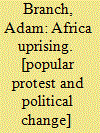

|
|
|
|
|
| Publication |
London, Zed Books, 2015.
|
| Description |
xi, 251p.hbk
|
| Contents |
(B)
|
| Standard Number |
9781780329987
|
|
|
|
|
|
|
|
|
|
|
|
Copies: C:1/I:0,R:0,Q:0
Circulation
| Accession# | Call# | Current Location | Status | Policy | Location |
| 058379 | 960/BRA 058379 | Main | On Shelf | General | |
|
|
|
|
| 5 |
ID:
106430
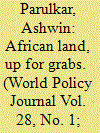

|
|
|
|
|
| Publication |
2011.
|
| Summary/Abstract |
Sheikh Mohammed Hussein Ali Al Amoudi, a citizen of Saudi Arabia, spends his time shuttling between Riyadh and Ethiopia, where he was born in a village 64 years ago. The son of a Yemeni father and Ethiopian mother, Al Amoudi boasts an estimated net worth of $10 billion. He is the richest Ethiopian and, according to Forbes, the 64th richest man in the world. Forty-five years ago, he emigrated to Saudi Arabia and built his fortune in oil refineries and the booming construction industry.
|
|
|
|
|
|
|
|
|
|
|
|
|
|
|
|
| 6 |
ID:
160028


|
|
|
|
|
| Summary/Abstract |
Why do partitioned successor states engage one another in armed conflict? We explore the drivers of war between successor states by comparing two border crises that followed the partitions of Ethiopia (1993) and Sudan (2011). We argue that the politico-military struggles that give way to partition create important historical memories that shape what successor states think about the utility of military force. While the partition of Ethiopia yielded successor states led by regimes that were victors of the preceding war of partition, the war of partition in Sudan produced successor states that emerged out of military stalemate. This distinction explains why Ethiopia and Eritrea waged a costly border war that Sudan and South Sudan were able to avoid.
|
|
|
|
|
|
|
|
|
|
|
|
|
|
|
|
| 7 |
ID:
120104
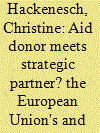

|
|
|
|
|
| Publication |
2013.
|
| Summary/Abstract |
The motives, instruments and effects of China's Africa policy have spurred a lively debate in European development policy circles. This paper assesses the "competitive pressure" that China's growing presence in Africa exerts on the European development policy regime. Drawing on a large number of interviews conducted in China, Ethiopia and Europe between 2008 and 2011, the paper analyses Ethiopia as a case study. Ethiopia has emerged as one of the most important countries in Chinese as well as European cooperation with Africa. Yet, Chinese and European policies toward Ethiopia differ greatly. The EU mainly engages Ethiopia as an aid recipient, whereas China has developed a comprehensive political and economic partnership with the East African state. China has thereby become an alternative partner to the Ethiopian government, a development that both sheds light on the gap between European rhetoric and policy practice and puts pressure on the EU to make more efforts to reform its development policy system.
|
|
|
|
|
|
|
|
|
|
|
|
|
|
|
|
| 8 |
ID:
140334
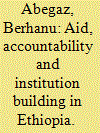

|
|
|
|
|
| Summary/Abstract |
Forty billion dollars of ODA over the past two decades has reduced destitution in post-socialist and post-conflict Ethiopia. It has also boosted the technocratic capacity of exclusionary state institutions, while doubly enfeebling the fledgling private sector and independent political and civic organisations. This aid–institution paradox is a product of an alignment of donor–recipient strategic interests. The five major donors pursued geopolitical and poverty reduction objectives; and the narrowly based ruling elite sought total capture of the state, ownership of the development agenda and use of pro-poor growth to leverage large aid inflows and to seek domestic political legitimacy. By coupling poverty reduction with adequate space for inclusive market, civic and political engagement, a farsighted coalition of donors could have complemented capacity building with the promotion of state resilience. Scaled-up aid can still be delivered, as in Eastern Europe, conditional on meaningful mutual accountability and the rule of law.
|
|
|
|
|
|
|
|
|
|
|
|
|
|
|
|
| 9 |
ID:
103423
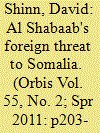

|
|
|
|
|
| Publication |
2011.
|
| Summary/Abstract |
This article focuses on the threat to Somalia by al Shabaab (The Youth), an extremist organization that controls most of southern and central Somalia. It learned its strategy and tactics from al Qaeda and the Taliban and relies heavily on a relatively small number of foreign fighters, most of whom are Somalis with foreign passports from the large Somali diaspora. The non-Somali contingent probably numbers only about 200 to 300, although it brings battlefield experience from Afghanistan and Iraq and provides al Shabaab with expertise in bomb making, remote-controlled explosions, suicide bombing and assassinations. Some of the foreigners occupy key positions in al Shabaab. The connection between al Shabaab and al Qaeda is growing stronger but has not yet reached the level of operational control by al Qaeda. Al Shabaab's draconian tactics, which are imported from outside and are anathema to most Somalis, and its foreign component may be its undoing.
|
|
|
|
|
|
|
|
|
|
|
|
|
|
|
|
| 10 |
ID:
119116
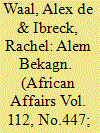

|
|
|
|
|
| Publication |
2013.
|
| Summary/Abstract |
The African Union's new offices in Addis Ababa stand upon the site of the city's former central prison, known as Alem Bekagn, where thousands of people suffered and died. This article traces the history of the prison and examines efforts to create a memorial at the site. These initiatives illustrate the African Union (AU) in transition. They echo AU commitments to act against atrocities and in support of rights and justice and suggest a distinct vision of pan-African community and a corresponding institutional culture. But, much like the AU itself, the meaning of the planned memorial is ambivalent and contested. The fact that the AU bulldozed Ethiopia's most notorious prison in order to establish its new offices and a conference hall is richly symbolic of 'buried memory' - the tendency of post-colonial elites to suppress the memory of victims of state violence while celebrating chosen heroes. The AU still venerates leaders and is quiet about current violations, but the organization's promise and process to remember the ordinary victims of state violence indicate a political opening and may contribute a novel space for the recounting of human rights abuses.
|
|
|
|
|
|
|
|
|
|
|
|
|
|
|
|
| 11 |
ID:
185759


|
|
|
|
|
| Summary/Abstract |
The civil war that erupted in November 2020 in Ethiopia was a culmination of several overlapping, long-running conflicts. The main conflict involves the nature of the Ethiopian state: whether it should be a unified structure reflecting a singular national identity, or a multiethnic federal system preserving autonomy for regional states. The discrete conflicts involve tensions between the central state and the regional states of Tigray and Oromo; territorial disputes between different ethnic groups; and an old rivalry between the regime of neighboring Eritrea and the ruling party in Tigray. The complex layers of the war make peace all the more elusive.
|
|
|
|
|
|
|
|
|
|
|
|
|
|
|
|
| 12 |
ID:
186748
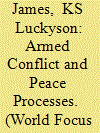

|
|
|
|
|
| Summary/Abstract |
The African continent is a politically unstable, and volatile regions in the world. For instance, in Cameroon, the national dialogue is the only way forward to empower all sections of society to resolve the crisis. Ethiopia has a multi-ethnic and cultural diversity adopted the system of ethnic federalism. The political instability was due to the demand of the Tigray ethnic group to restore its dominant position. The peace process for ending the civil war is still a difficult task as the demand for regional autonomy of Tigray has intensified.
|
|
|
|
|
|
|
|
|
|
|
|
|
|
|
|
| 13 |
ID:
167819
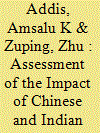

|
|
|
|
|
| Summary/Abstract |
In Africa, China and India are considered to be following a donor–recipient approach and are explicitly criticised for exploiting the continent’s energy resources. This study focuses on the presence of the Asian countries in terms of institutional theory, historical connections, instrumental motivations and political engagement with Africa in general, and with Ethiopia in particular. India offers non-pecuniary value, such as scholarship and technical assistance, whereas China focuses on a wider range of economic aids and non-pecuniary packages; thus, both countries are well positioned in Africa. This study is an exercise audit of the impact of Chinese and Indian economic activities on Ethiopia’s economic growth and examines the period from 1992 to 2016 from historical and contemporary perspectives. This study also includes a case study of members of Ethiopian society’s attitudes towards the presence and prospects of Chinese and Indian investment projects and its perceptions of these projects. Although some long-term developmental impacts remain uncertain, this study argues that the presence of the Asian drivers has favoured Ethiopia in many investment sectors and concludes that the overall impact of the Asian drivers on Ethiopia is beneficial. To collect primary data, individual and group interviews and discussions were conducted.
|
|
|
|
|
|
|
|
|
|
|
|
|
|
|
|
| 14 |
ID:
138341


|
|
|
|
|
| Summary/Abstract |
Debate on the ‘securitization’ of aid and international development since 9/11 has been anchored in two key claims: that the phenomenon has been driven and imposed by western governments and that this is wholly unwelcome and deleterious for those in Africa and elsewhere in the developing world. This article challenges both of these assumptions by demonstrating how a range of African regimes have not only benefited from this dispensation but have also actively encouraged and shaped it, even incorporating it into their own militarized state-building projects. Drawing on the cases of Chad, Ethiopia, Uganda and Rwanda—four semi-authoritarian polities which have been sustained by the securitization trend—we argue that these developments have not been an accidental by-product of the global ‘war on terror’. Instead, we contend, they have been the result of a deliberate set of choices and policy decisions by these African governments as part of a broader ‘illiberal state-building’ agenda. In delineating this argument we outline four major strategies employed by these regimes in this regard: ‘playing the proxy’; simultaneous ‘socialization’ of development policy and ‘privatization’ of security affairs; making donors complicit in de facto regional security arrangements; and constructing regime ‘enemies’ as broader, international threats.
|
|
|
|
|
|
|
|
|
|
|
|
|
|
|
|
| 15 |
ID:
125605


|
|
|
|
|
| Publication |
2013.
|
| Summary/Abstract |
There is considerable controversy about the impact of biofuels on food security in developing countries. A major concern is that biofuels reduce food security by increasing food prices. In this paper we use survey evidence to assess the impact of castor production on poor and food insecure rural households in Ethiopia. About 1/3 of poor farmers have allocated on average 15% of their land to the production of castor beans under contract in biofuel supply chains. Castor production significantly improves their food security: they have fewer months without food and the amount of food they consume increases. Castor cultivation is beneficial for participating households' food security in several ways: by generating cash income from castor contracts, they can store food for the lean season; castor beans preserve well on the field which allows sales when farmers are in need of cash (or food); spillover effects of castor contracts increases the productivity of food crops. Increased food crop productivity offsets the amount of land used for castor so that the total local food supply is not affected.
|
|
|
|
|
|
|
|
|
|
|
|
|
|
|
|
| 16 |
ID:
174736
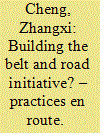

|
|
|
|
|
| Summary/Abstract |
This study attempts to understand the pragmatic development of the belt and road initiative (BRI) in light of the Chinese government’s stated claim that the BRI will be ‘using key economic industrial parks as cooperation platforms’. Through the examination of three overseas economic and trade cooperation zones in the context of the BRI, this study engages with current Chinese language work on the BRI to argue that whilst at the regional level some initiatives may be workable and able to deliver given certain circumstances, in consideration of the goal of continuous expansion of the BRI, both the Chinese government’s role and corporate awareness by Chinese investors is lacking and has undermined general policy goals.
|
|
|
|
|
|
|
|
|
|
|
|
|
|
|
|
| 17 |
ID:
027780
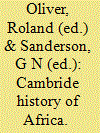

|
|
|
|
|
| Publication |
Cambridge, Cambridge University Press, 1985.
|
| Description |
xvi, 956p.: mapshbk
|
| Contents |
Vol. VI: From 1870 to 1905
|
| Standard Number |
0521228034
|
|
|
|
|
|
|
|
|
|
|
|
Copies: C:1/I:0,R:0,Q:0
Circulation
| Accession# | Call# | Current Location | Status | Policy | Location |
| 028111 | 960/OLI 028111 | Main | On Shelf | General | |
|
|
|
|
| 18 |
ID:
094323
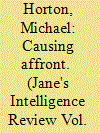

|
|
|
| 19 |
ID:
116545
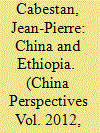

|
|
|
|
|
| Publication |
2012.
|
| Summary/Abstract |
Since 1995, China and Ethiopia have gradually forged close relations. On both sides, the establishment of this partnership was motivated as much by diplomatic, strategic, and even ideological considerations as by economic ones. For Beijing, economic and trade cooperation with Addis Ababa is a means rather than an end in itself. For Ethiopia, however, partnership with China mainly serves the internal political and economic purposes of the regime that has been in place since 1991, under Prime Minister Meles Zenawi for 20 years and, since his death in August 2012, under his successor Hailemariam Desalegn. The relationship is characteristic of the special but asymmetrical links Beijing has sought to establish with countries of the South that are strategically important but economically backward. It also illustrates the attraction the "Chinese model" of development holds in Africa and elsewhere.
|
|
|
|
|
|
|
|
|
|
|
|
|
|
|
|
| 20 |
ID:
186172
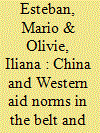

|
|
|
|
|
| Summary/Abstract |
Despite considerable debate on the normative foundations of Chinese international development cooperation and how they compare with those of traditional donors,positivist studies on the normative consequences of China’s socialization into mainstream international norms of development assistance are scarce. This article explores this topic for the case of Ethiopia, an aid ‘darling’ with an extended presence of Chinese and Western development actors, taking the Aid Effectiveness Agenda as reference. Resorting to official documents, data analysis, and semi-structured interviews, the authors find that Chinese development actors’ understanding of ownership and transparency is relatively stable and different from that of Western donors and that they promote their own understanding of those principles among Ethiopian stakeholders. There are, however, significant changes in inclusive partnerships and the focus on results, that have more to do with a pragmatic adaptation process by Chinese actors than with a socialization process through their interaction with traditional donors.
|
|
|
|
|
|
|
|
|
|
|
|
|
|
|
|
|
|
|
|
|